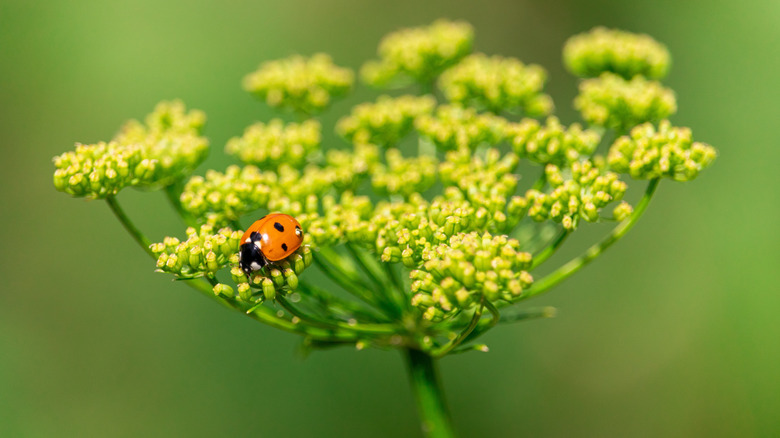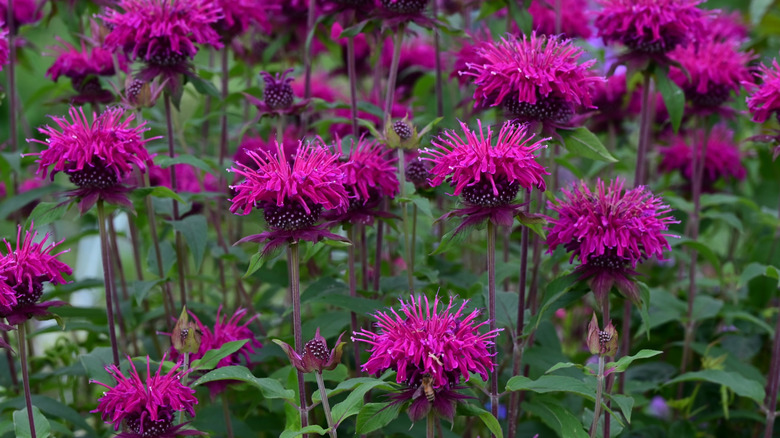The Two Herbs That Help Lemon Verbena Thrive
Whether you're growing a dedicated tea garden or a fragrant herb patch, adding a richly scented plant like lemon verbena is a great way to elevate your outdoor space. Praised worldwide for its nearly true lemon scent, lemon verbena (Aloysia citriodora) is used to make oil, flavor desserts, and brew tea. It thrives alongside other sun-loving herbs, so it's key that you choose the right companion plants when growing and caring for lemon verbena. By complementing your lemon verbena with dill and bee balm, you can attract beneficial insects to battle pests while cultivating a bright, aromatic garden.
A native of Chile and Argentina, lemon verbena is an herbaceous perennial hardy in USDA Hardiness Zones 8 through 10. This low-maintenance summer bloomer can grow up to 15 feet tall in the wild, but it's more likely to reach between 6 and 8 feet tall when grown as an annual. With anti-inflammatory and digestive aid properties, lemon verbena is a staple in tea and medicinal gardens. But while it's considered a generally healthy plant, it can struggle with damaging spider mite infestations.
Planting dill with your lemon verbena may help you control these pests by attracting the beneficial insects that prey on them. Bee balm, which enjoys similar growing conditions to lemon verbena, makes a great visual complement while inviting even more pollinators to the area. What's more: All three herbs can be harvested for culinary, tea, or medicinal use, making them an exceptional combination in any edible garden.
Attracting beneficial insects with dill
Companion planting is an easy way to bring good insects into your garden. Dill (Anethum graveolens) is no stranger to beneficial insects, as this herbaceous annual naturalized in much of the United States also serves as the larval host of the black swallowtail butterfly. But when it comes to choosing a companion plant to help keep your lemon verbena free of rapidly spreading spider mites, dill's delicate, umbrella-like blooms play an important role. These tiny yellow blossoms attract lacewings and ladybugs — natural predators that feed on spider mites. To invite these helpful bugs into your garden, allow your dill plant to flower, or bolt, instead of harvesting it throughout the season.
Dill's uses don't stop at pest control, though. Stemming from the Old Norse word "dilla," meaning to soothe or calm, dill has historically been used as a digestive aid or to treat an upset stomach. The leafy stalk is a kitchen staple for cooking and pickling, and the leaves can be used alongside lemon verbena to make tea, making it a useful addition to any garden. Despite reaching up to 5 feet tall depending on the variety, this member of the Apiaceae family isn't a competitive grower, so you won't have to worry about it stifling your lemon verbena.
Complement your lemon verbena with bee balm
Like lemon verbena, bee balm (Monarda didyma) is one of many great plants to grow for homemade herbal tea. It also has a long history as a medicinal herb; in fact, the common name bee balm is a nod to the herb's ability to soothe bee stings. Although it's sometimes called wild bergamot, bee balm is not the same as the bergamot orange used to create Earl Grey tea's distinctive flavor. Instead, this musky member of the Lamiaceae, or mint, family has a mildly sweet, minty scent with a hint of citrus, making it the perfect complement to your lemon verbena's vibrant aroma both in the garden and the teapot.
Hardy and perennial in zones 4 through 9, bee balm thrives in soil with high organic matter, neutral pH, and good drainage — the same growing conditions your lemon verbena prefers. However, since lemon verbena is only winter hardy to zone 8, planting bee balm alongside it is a great way to extend your tea or herb garden's growing season in colder zones. With bee balm's continued blooms, your garden will remain a fragrant pollinator haven long after you've harvested your lemon verbena. And in frost-free climates, you can enjoy these mingling aromas well into fall.


